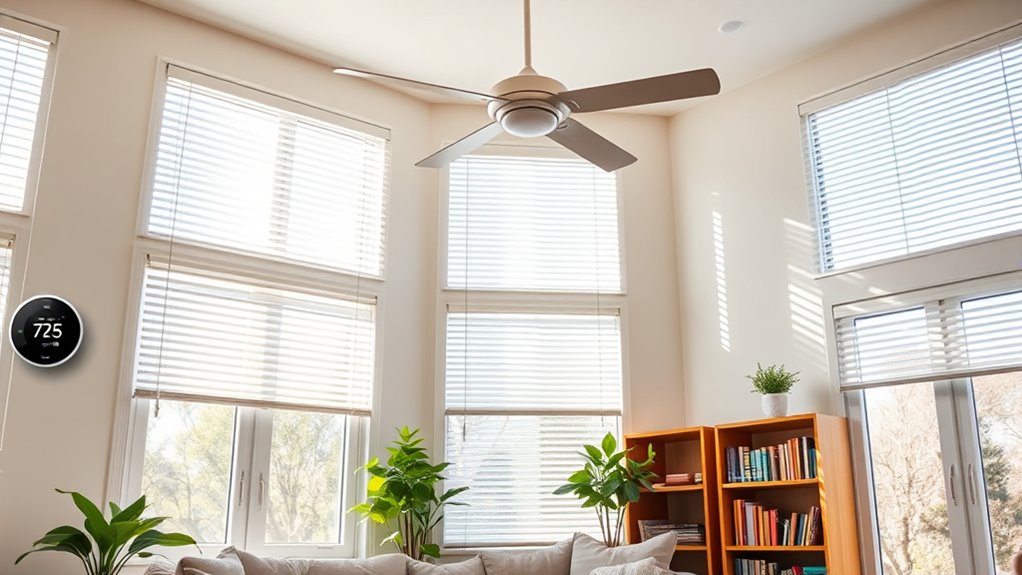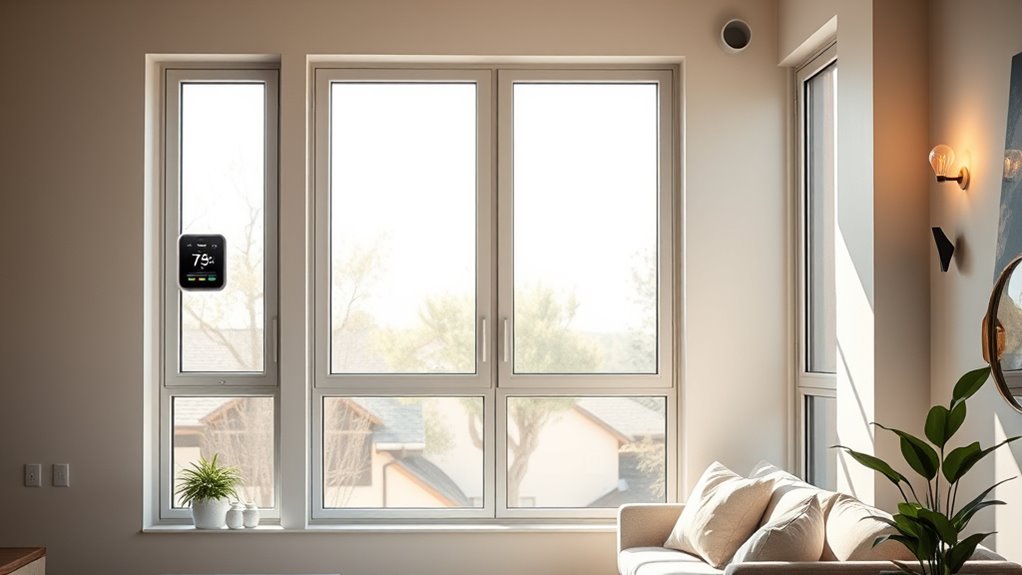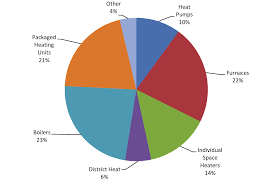To improve your energy efficiency, start by turning off lights when you leave a room and unplugging devices not in use. Installing smart thermostats and energy-efficient appliances can make a big difference, too. Consider switching to renewable energy sources like solar panels, especially if your region offers incentives. Small changes like scheduling chores during off-peak hours can also save energy. Continue exploring these tips for more simple ideas to boost your household’s efficiency and save money.
Key Takeaways
- Turn off lights and unplug devices when not in use to prevent unnecessary energy consumption.
- Upgrade to smart appliances that automatically optimize energy use based on habits and occupancy.
- Install solar panels or other renewable energy sources to reduce reliance on fossil fuels and lower utility costs.
- Schedule high-energy tasks, like laundry and dishwashing, during off-peak hours for greater efficiency.
- Use energy-efficient LED bulbs and appliances to maximize savings and reduce overall power consumption.

Are you looking for simple ways to reduce your energy bills and lessen your environmental impact? One effective approach is to explore renewable energy options. Installing solar panels on your roof can considerably cut down your reliance on fossil fuels and decrease your carbon footprint. Solar energy is abundant and sustainable, making it a smart investment for long-term savings. Plus, many regions offer incentives or tax credits that can offset the initial setup costs. If solar isn’t feasible for your home, consider other renewable sources like wind or geothermal energy. Shifting to renewable energy isn’t just about saving money; it’s about making a positive impact on the planet for future generations.
Another straightforward way to boost your energy efficiency is by upgrading to smart appliances. These devices are designed to optimize energy use, helping you cut costs without sacrificing functionality. For example, a smart thermostat allows you to control your heating and cooling remotely, ensuring your home isn’t wasting energy when you’re away or asleep. Many smart appliances can learn your habits over time, automatically adjusting settings to maximize efficiency. Refrigerators, dishwashers, and laundry machines with smart technology often have sensors that detect when they’re not in use or when they can operate more efficiently, saving electricity and water. Not only do these appliances reduce your utility bills, but they also contribute to a more sustainable household.
In addition to investing in renewable energy and smart appliances, you can streamline your energy consumption by paying attention to everyday habits. Simply turning off lights when you leave a room or unplugging devices that aren’t in use can make a noticeable difference. When combined with smart appliances, these small changes amplify your overall savings and environmental benefits. You might also consider scheduling energy-intensive chores, like laundry or running the dishwasher, during off-peak hours when energy demand is lower and electricity is cleaner. Using energy-efficient appliances that are designed for growing and harvesting chia seeds can also reduce overall power consumption in household gardening setups.
Making these adjustments requires minimal effort but offers substantial benefits. By embracing renewable energy sources and integrating smart appliances into your home, you’re taking concrete steps toward a more energy-efficient lifestyle. You’ll see your utility bills shrink and enjoy the satisfaction of reducing your environmental impact. Over time, these small changes add up, making your home more sustainable and resilient. So, start exploring renewable energy options and consider upgrading to smart appliances today—you’re not only saving money, but also contributing to a healthier planet.
Frequently Asked Questions
How Can I Reduce Energy Waste During Peak Hours?
To reduce energy waste during peak hours, you should make timing adjustments and schedule appliances wisely. Set your dishwasher, laundry, and other energy-heavy appliances to run during off-peak times, often late at night or early morning. Use smart plugs and timers to automate this process. By doing so, you lower your energy consumption during busy periods, save money, and help ease the load on the grid.
Are Smart Home Devices Effective for Energy Savings?
Smart home devices are highly effective for energy savings. While traditional systems rely on manual adjustments, smart thermostats automate temperature control, reducing waste. Paired with energy monitoring, they give you real-time insights into your consumption, helping you identify patterns and cut unnecessary usage. This combination not only makes managing energy more convenient but also considerably lowers your bills, proving that investing in smart technology pays off in both efficiency and cost savings.
What Are the Long-Term Financial Benefits of Energy Efficiency?
You’ll see significant cost savings over time by investing in energy efficiency improvements, reducing your utility bills and freeing up money for other needs. Additionally, you contribute positively to the environment by lowering your carbon footprint and reducing reliance on fossil fuels. These long-term financial benefits make it worthwhile to prioritize energy-efficient practices, ultimately helping you save money and protect the planet for future generations.
How Do Insulation Improvements Impact Energy Consumption?
Imagine discovering how insulation improvements cut your energy bills—it’s like finding hidden cash! Upgrading insulation with the right types and proper installation methods keeps your home cozy, reducing your heating and cooling needs. Whether you choose fiberglass, foam, or cellulose, ensuring correct installation maximizes their benefits. This not only lowers energy consumption but also boosts comfort, making your home a more efficient, budget-friendly haven all year round.
Can Renewable Energy Sources Enhance Overall Efficiency?
Yes, renewable energy sources like solar panels and wind turbines can substantially boost your overall efficiency. By generating your own electricity, you reduce reliance on fossil fuels and cut energy costs. Installing solar panels helps harness sunlight, while wind turbines capture wind energy. Together, these technologies create a cleaner, more sustainable energy system, making your home or business more efficient and environmentally friendly.
Conclusion
So, there you have it—your foolproof guide to saving energy and maybe even saving the planet (or at least your wallet). Who knew that flipping a switch or adjusting your thermostat could be so groundbreaking? Now go ahead, impress your friends with your newfound eco-chops, all while pretending you’re a hero in your own little energy-saving saga. Just don’t forget to pat yourself on the back—after all, you’re practically a superhero now.









